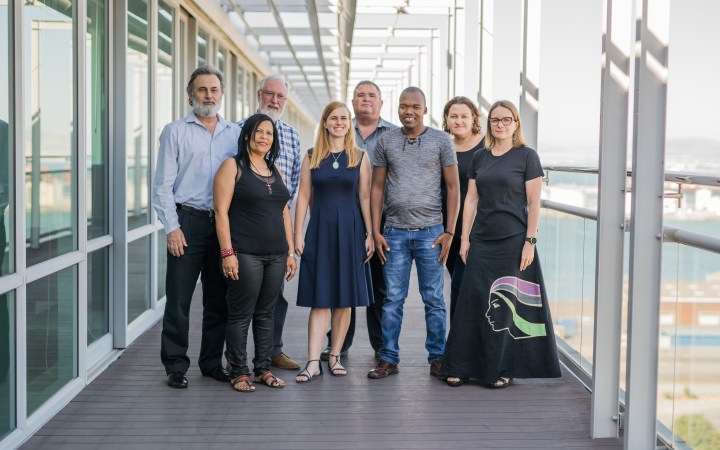GROUNDUP
ConCourt permits environmental activists to revise pleas in ‘Slapp case’ brought by Australian miners

Marathon legal battle against R14.25-million defamation case continues.
Six South African activists and public interest lawyers have filed revised papers in their marathon legal battle against a collective R14.25-million “Slapp” defamation case brought against them by Australian mining interests.
This revision follows a pair of judgments handed down by the Constitutional Court, which for the first time in South African legal history set out parameters for defence against Slapp suits, and also prescribed limits on defamation action brought by for-profit trading corporations.
Slapp is an acronym for Strategic Litigation Against Public Participation, and describes a legal strategy often employed by big corporations that bring defamation actions for huge amounts against individuals who criticise them, as a means of discouraging, censoring, intimidating and silencing these critics.
“The pair of landmark judgments [by the Constitutional Court] … for the first time recognise Slapp as an abuse of process, and carve out a limitation to trading corporations’ ability to claim damages for reputational harm. The judgments have important consequences for the protection of activism and the rights and responsibilities of corporations in South Africa and beyond,” non-profit activist lawyer group Centre for Environmental Rights (CER) commented after the judgments were handed down in November.
Two of the six defendants were employed by the CER as environmental lawyers at the time of the alleged defamation.
While neither of the Constitutional Court judgments was technically in the six defendants’ favour, they were not penalised with costs, and were given a 30-day window in which to amend their two special pleas in the case.
Notices of intention to amend were duly filed in the Western Cape high court.
The defendants’ first special plea relates to the court’s ruling that a Slapp defence must also take the merits of the alleged defamation into account, because improper motive for bringing a case is alone insufficient to warrant dismissal of such an action.
This plea has been amended by the addition of a brief paragraph about merit that reads: “The plaintiffs have weak prospects of succeeding in their claims for defamation against the defendants and/or the relief sought against the defendants.”
The defendants’ second special plea — that “for-profit” trading corporations (such as the two Australian mining company plaintiffs) cannot sue for general damages in defamation cases — has also been amended.
Visit Daily Maverick’s home page for more news, analysis and investigations
The Constitutional Court found that such corporations can sue for general damages, but not where the allegedly defamatory speech forms part of public discussion on issues of legitimate public interest. This is because awarding such damages would constitute an unjustifiable limitation on the right to freedom of speech.
The defendants’ amended second special plea argues that claims for damages by the first plaintiffs — Mineral Sands Resources and Mineral Commodities Ltd — are bad in law because: the allegedly defamatory statements concerned form part of public discourse and concern an issue of public interest; and the plaintiffs claim general damages and do not allege that they suffered any patrimonial [actual monetary] loss arising from the alleged defamatory statements concerned.
“In the circumstances, the first plaintiffs’ claim for damages falls to be dismissed with costs,” they argue.
There is as yet no indication of whether or when the proposed amendments to the defendants’ special pleas will be opposed by the plaintiffs.
Lawyers for both sets of parties are playing their cards close to their chests in this highly complex and extended case; the first papers were filed more than five years ago.
Ross Kudo, attorney for the plaintiffs, said the defamation action was continuing and that his clients’ next steps would be disclosed during the course of the litigation.
He pointed out that, until now, there had been agreement between all the parties that the issues before court would be dealt with collectively as a matter of convenience. However, there were actually three separate defamation cases, and collective agreement might not extend to the trial stage.
“In other words, each trial may be dealt with separately,” he said.
Currently, there was no indication of when the trial or trials would be set down for hearing, Kudo added. “Due to the length of time it takes to obtain a trial date, and depending on how the various matters progress, the trial will most likely not be heard this year.”
The six South African defendants are: environmental lawyers Christine Reddell, Tracey Davies and Cormac Cullinan; social worker John GI Clarke; and community activists Mzamo Dlamini of the Wild Coast and Davine Cloete from Lutzville on the West Coast.
They are alleged to have defamed the plaintiffs: Australian mining company Mineral Commodities Ltd (MRC) and its South African subsidiary Mineral Sands Resources; then MRC executive chairman Mark Caruso (he is no longer with MRC); and MRC’s black empowerment partner Zamile Qunya.
The allegations stem from comments made at various times and places in books, interviews and/or presentations about the miners’ controversial activities on the Pondoland coast at Xolobeni and at the Tormin mineral sands mine on the West Coast. DM
First published by GroundUp.



















 Become an Insider
Become an Insider
Another example of how our legal system, and even the much hailed constitution itself, is geared for the corporations and those who can afford to sustain legal action. The only, and I must emphasise this, only real recourse activists and the public have when it comes to resisting the exploitation of natural assets by mining companies, is public criticism. The fact that the courts even consider the merits of a SLAPP case tips the balance of the scales to favour the corporations/ mining companies. The freedom to criticise a mining company’s plans to exploit the environment should be enshrined in our constitution, not the right of the mining company to SLAPP anyone who dares to!